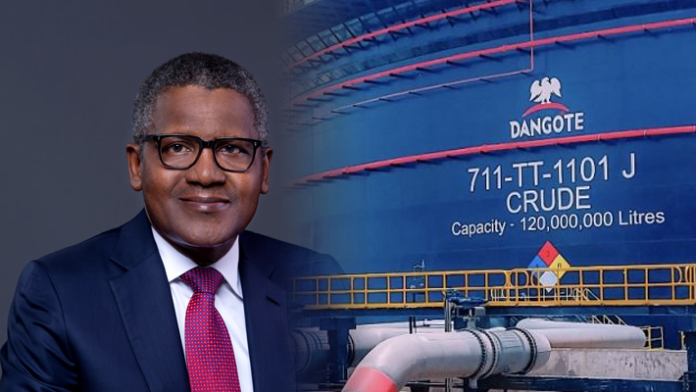Due to the Dangote Oil Refinery’s increasing demand for the hydrocarbon, Nigeria, Africa’s top producer of crude oil, has increased its imports of U.S. WTI crude.
With an established capacity of 650,000 barrels per day, the refinery is the biggest in Africa and among the most important crude processing plants globally.
Aliko Dangote, the richest man in Africa with an estimated net worth of $28 billion, owns the refinery.
The Dangote Refinery, which is close to Nigeria’s commercial hub, has bought roughly one-third of its oil from the US, mostly the West Texas Intermediate (WTI) Midland grade, according to Bloomberg’s ship-tracking data. Since 2024, when the refinery started increasing its operations, this percentage has almost doubled.
A combination of operational and strategic issues are cited by analysts as the reason for the rise in the purchase of U.S. crude.
In the face of international competition, OPEC member countries have had difficulty scaling up their crude output economically. As the 650,000-bpd refinery approaches full operating capacity, this dynamic has enabled it to purchase more stored U.S. crude, especially WTI.
WTI’s greater production of refined products and gasoline is another factor contributing to Dangote’s preference.
The ongoing trade disputes between the United States and China also caused some areas of the Asian market for WTI crude to decrease this year, which increased the supply of American petroleum for other regions, such as West Africa.
A decrease in the supply of Nigerian crude coincides with the rise in U.S. crude consumption. According to Bloomberg analysis, Dangote’s June imports are anticipated to consist more of U.S. oil than domestic supply.
Fuel production at the Dangote refinery started in 2024. In January, diesel and naphtha were produced, and in September, gasoline.
The refinery’s increased processing levels and the decline in the amount of Nigerian crude available for purchase are in line with the use of U.S. oil.
Midland WTI: The Leading Grade
Out of the six benchmark crude grades, WTI Midland is by far the largest stream. Due to worries that the slow depletion of the other five North Sea-sourced companies—Brent, Forties, Oseberg, Ekofisk, and Troll—could otherwise raise market volatility, it was added to the price basket.
Traders keeping an eye on Dangote’s buying habits predict that this summer, the refinery’s WTI Midland intake will approach 14 million barrels. According to vessel bookings, the biggest provider of these U.S. barrels is the trading behemoth Vitol Group.
By naming the primary access road to the Dangote Refinery after Nigerian President Bola Tinubu, Dangote acknowledged the president’s continued support for the project and for privately controlled infrastructure development. The news was given during the Deep-Sea Port Access Road’s formal commissioning in Lagos State, which links Eleko Junction with the Dangote Fertilizer Plant.
Dangote addressed President Tinubu, saying, “The Dangote Refinery complex is largely your fault. Let me inform you, Mr. President, that the main route to our refinery will now be Bola Ahmed Tinubu Road.
He went on to say that President Tinubu has boosted investor confidence in spite of the difficult economic climate. “You are a courageous leader, Mr. President. I hope you keep up the good work. Thank you for all of your encouragement and support.
Dangote claims that the renamed access road is a component of a wider network of infrastructure connected to the refinery. It is anticipated that this network will link Nigeria with its neighbors, including Cameroon and Chad.
Read Also: Ex-EFCC Chairman Bawa Reveals Nigeria’s $450 Million Loss to Fuel Subsidy Fraud
As a vital logistical route, the infrastructure also connects to the Sagamu–Benin Expressway via the Epe–Ijebu–Ode sector.
For the first time in three weeks, Crude reports weekly increases.
Growth forecasts in the two biggest economies in the world have increased due to a solid U.S. jobs report and the restart of trade negotiations between the US and China.
In the week’s last trading session, crude oil finished up $1 per barrel, its first weekly increase in three weeks. West Texas Intermediate crude had a 2% increase in price, closing the day at $64 per barrel.
The global oil market’s supply dynamics contributed to the price increase as well. In May, nine OPEC nations that are bound by production targets saw lower-than-expected increases in output.
The United Arab Emirates and Iraq either did not raise production at all or only slightly.
Libya, one of the three OPEC members exempt from restrictions, increased its daily production to more than 1.3 million barrels, a 13-year record. Compared to April, OPEC’s total output in May increased by around 200,000 barrels per day to 27.54 million barrels per day.
Join Television Nigerian Whatsapp Now
Join Television Nigerian Facebook Now
Join Television Nigerian Twitter Now
Join Television Nigerian YouTUbe Now






















